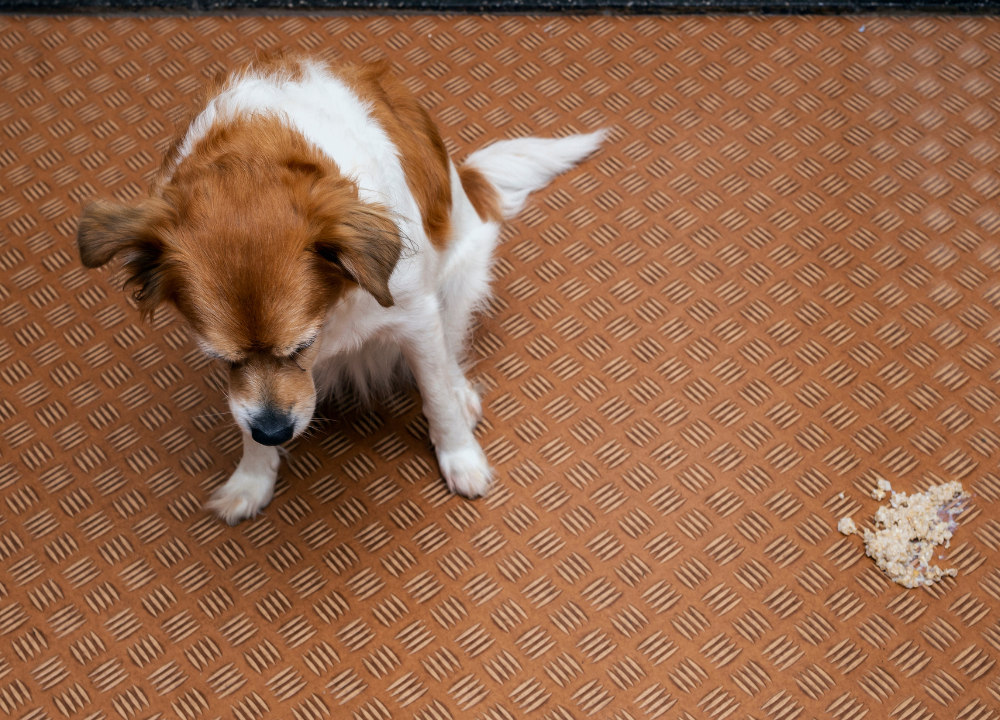Imagine this scenario: you come home to find your beloved furry friend, Fido, suffering from diarrhea. Concerned and bewildered, you try to figure out what could have caused this unpleasant ailment. Could it be something as seemingly harmless as a cow hoof chew toy? In this blog, we will delve into the hidden danger of cow hooves and explore whether they can indeed cause diarrhea in dogs.
Cow hooves have long been a popular choice for dog owners as a chew toy. They provide entertainment and help to keep your dog’s teeth clean. However, it is important to recognize that not all chew toys are created equal, and what may seem harmless can actually have unexpected consequences for your furry companion.
In this informative blog, we will address your concerns by discussing the potential risks of cow hooves, the digestive system of dogs, and how cow hooves may affect it. We will also provide insights into the signs and symptoms of diarrhea caused by cow hooves and offer alternative chew toy options that prioritize your dog’s health and well-being.
Join us on this journey as we uncover the truth about cow hooves and their potential impact on your dog’s digestive system.
Short Summmery
- Cow hooves, a popular choice as dog chews, may pose hidden dangers and potentially cause diarrhea in dogs.
- It is important to consider the safety of dog chews and be aware of the potential risks associated with cow hooves, such as intestinal blockage and digestive obstruction.
- Signs and symptoms of digestive issues, including diarrhea and abdominal pain, should prompt veterinary attention.
- Pet owners should properly supervise the usage of dog chews and explore safer alternatives to cow hooves, considering factors such as the size and chewing habits of their dogs.
Understanding the Safety of Dog Chews
When it comes to keeping our furry friends happy and entertained, dog chews are a popular choice for many pet owners. These chew toys not only provide mental stimulation but can also promote dental health by helping to remove plaque and tartar. However, it is crucial to be aware of the potential dangers associated with certain types of dog chews, such as cow hooves.
The Appeal of Cow Hooves as Dog Chews
Cow hooves have gained popularity as dog chews due to their durability and long-lasting nature. They are tough and can withstand the strong jaws of heavy chewers, making them seemingly ideal for aggressive chewers. Additionally, cow hooves are natural and readily available treats, often marketed as a safe and healthy option for our canine companions.
Potential Risks Involved
Despite their popularity, cow hooves come with their own set of risks that dog owners should be aware of. One major concern is the possibility of digestive obstruction. If a dog chews on a cow hoof for a prolonged period or ingests it in large chunks, there is a risk of the hoof causing blockages in the intestinal tract. This can lead to severe abdominal pain and, in some cases, surgical intervention may be necessary to remove the blockage.
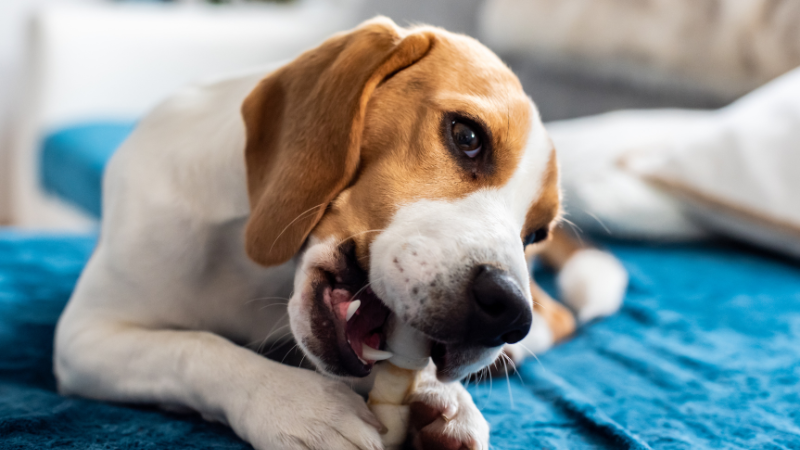
The Dangers of Sharp Edges
Another concern is the potential for sharp edges to form when a cow hoof is chewed on for an extended period. As the hoof wears down, it can develop sharp fragments or splinters that may cause injury to the dog’s mouth, throat, or gastrointestinal tract. These sharp edges can lead to irritation, inflammation, or even perforation in severe cases.
Safer Alternatives to Cow Hooves
Given the risks associated with cow hooves, it is important to consider safer alternatives for your furry friend. Bully sticks, for example, are a popular choice among dog owners as they are more digestible and less likely to cause blockages. Other options include specially designed chew toys, such as rubber or nylon bones, which are specifically crafted to provide both durability and safety.
The Role of the Dog Owner
As a responsible dog owner, it is essential to closely monitor your pet while they are chewing on any type of chew toy. Regularly inspect the toy for any signs of wear and tear, and remove it if it becomes too small or poses a choking hazard.
The Attraction of Cow Hooves as Dog Chews
When it comes to dog chews, there is a wide range of options available in the market. From bully sticks to pig ears, dog owners have numerous choices to keep their furry friends entertained and promote dental health. One such popular choice is cow hooves. Let’s take a closer look at why cow hooves have become a go-to chew for many pet owners.
1. Long-lasting and durable: Cow hooves are known for their toughness and durability, making them ideal for heavy chewers or aggressive chewers. Unlike softer chew toys that can be easily destroyed within minutes, cow hooves provide a long-lasting chew experience that can keep your dog occupied for an extended period.
2. Natural and odorless: Cow hooves are a natural byproduct of the beef industry, which means they are free from artificial ingredients and additives that can be harmful to your dog’s health. Additionally, unlike some other dog chews, cow hooves are generally odorless, making them a more pleasant option for both dogs and their owners.
Petstages Dogwood Wood Alternative Dog Chew Toy, Large
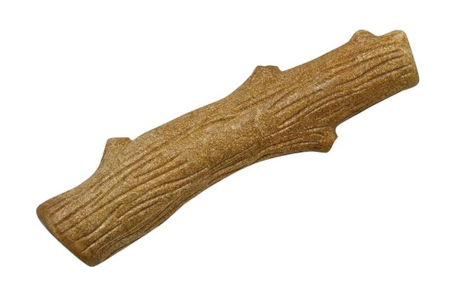
3. Dental benefits: Chewing on cow hooves can help improve your dog’s dental health. As dogs gnaw on the hooves, the natural abrasive texture helps remove plaque and tartar buildup, promoting healthier gums and fresher breath. It can also provide a satisfying chewing experience that mimics the natural behavior of wild canines, which can help alleviate boredom and reduce destructive chewing habits.
4. Safety precautions: While cow hooves offer many benefits, it is crucial to ensure your dog chews them safely. Here are some safety tips to keep in mind:
Supervision: Always supervise your dog while they chew on cow hooves to monitor their behavior and prevent any potential issues.
100% Natural Whole Pig Ear Dog Treat
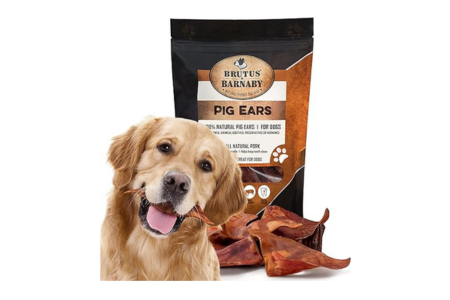
Size and chunks: Give your dog an appropriately sized cow hoof based on their breed and chewing habits. Avoid giving them hooves that are too small, as they may pose a choking hazard. Additionally, discourage your dog from trying to swallow large chunks of the hoof, as it can potentially lead to digestive obstruction.
Sharp edges: Check the cow hooves for any sharp edges or splintering, as these can cause injuries to your dog’s mouth or digestive tract.
💡 key Takeaway: Cow hooves are a popular choice for dog chews due to their durability, natural composition, and dental benefits.
Potential Risks of Cow Hooves
When it comes to choosing chew toys for your beloved furry friend, it’s essential to consider the potential risks associated with certain options. Cow hooves, often marketed as dog chews, may seem like a natural and durable choice, but they can pose hidden dangers to your canine companion. Let’s explore the potential risks that cow hooves may present for your dog’s health and wellbeing.
Digestive Obstruction:
One of the primary concerns with cow hooves as chew toys is the risk of digestive obstruction. Cow hooves are known to be extremely hard and can splinter when chewed for a long time or in large chunks. Dogs, especially aggressive chewers, may break off a large piece of the hoof, which can become lodged in the intestinal tract, leading to a potentially life-threatening condition. This can result in symptoms such as diarrhea, abdominal pain, and even require immediate veterinary attention.
Dental Health Risks:
While cow hooves may provide a satisfying chewing experience, they can also pose risks to your dog’s dental health. The rough and hard texture of cow hooves can cause excessive wear on your dog’s teeth, leading to damage such as fractures or even tooth loss. Additionally, the sharp edges that can form when a hoof splinters may injure the gums or the lower jaw, causing discomfort and potential infections.
Choking Hazard:
Another risk associated with cow hooves is the potential for choking. If a dog bites off a smaller piece of the hoof that becomes lodged in their throat, it can obstruct their airway and lead to a choking emergency. This risk is especially elevated if the size of the cow hoof is not appropriate for the size of your dog or if they are not adequately supervised while chewing.
Bacterial Contamination:
Cow hooves, just like any other animal-based chew, can carry bacteria that may pose a risk to your dog’s health. The process of handling and processing hooves during production can introduce bacteria, including harmful strains such as Salmonella or E. coli. While dogs typically have a more robust digestive system than humans, there is still a potential risk of bacterial infection, especially for dogs with compromised immune systems or underlying health conditions.
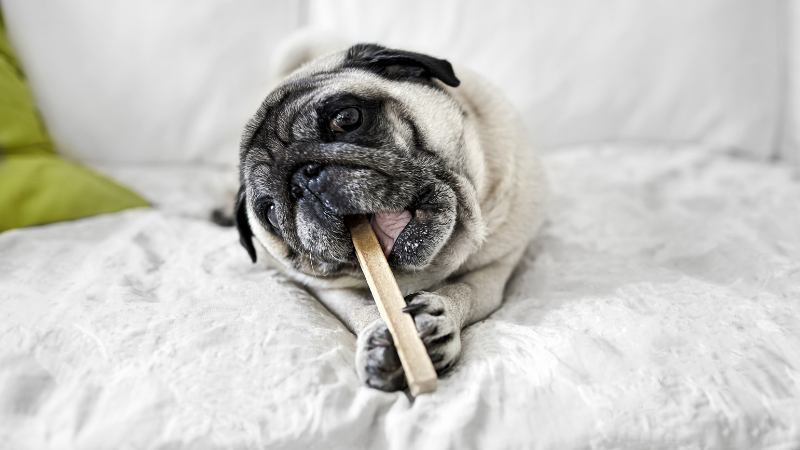
Signs and Symptoms of Digestive Issues
Digestive issues in dogs can be a cause for concern and should never be ignored. If your furry friend has been chewing on cow hooves or any other type of chew toy, it’s important to watch out for signs and symptoms of potential problems. Here are some common indicators that your dog may be experiencing digestive issues:
1. Diarrhea: One of the most obvious signs of digestive problems in dogs is diarrhea. If you notice your dog having loose, watery stools after chewing on a cow hoof or any other chew toy, it could be a sign of an upset stomach or intestinal irritation. Diarrhea can lead to dehydration, so it’s crucial to monitor your dog’s water intake and seek veterinary attention if the symptoms persist.
2. Vomiting: In some cases, dogs may vomit after chewing on a cow hoof. This could be caused by the ingestion of a large chunk or piece of the hoof that is difficult to digest. Vomiting can also be a sign of more serious issues such as an intestinal blockage. If you notice your dog vomiting repeatedly or if there is blood in the vomit, it’s important to consult with a veterinarian immediately.
3. Lack of Appetite: Digestive issues can often cause a loss of appetite in dogs. If your dog normally has a healthy appetite but suddenly shows disinterest in food after chewing on a cow hoof, it could be a sign of an underlying problem. Keep an eye on your dog’s eating habits and consult with a veterinarian if the lack of appetite persists.
4. Abdominal Discomfort: Dogs experiencing digestive issues may show signs of abdominal discomfort. This can manifest as restlessness, whining, or sensitivity when their belly is touched. If you notice your dog exhibiting these symptoms after chewing on a cow hoof, it’s important to closely monitor their behavior and seek veterinary attention if necessary.
Quote: According to pet expert Dr. Emily Wilson, “Digestive issues in dogs can range from mild to severe. It’s important for dog owners to be alert to any changes in their pet’s bowel movements or behavior after chewing on certain types of chews, such as cow hooves.”
Steps to take if you suspect digestive issues:
- Monitor your dog’s symptoms closely and take note of any changes or worsening conditions.
- Provide your dog with plenty of fresh water to prevent dehydration.
- Consult with a veterinarian for proper diagnosis and treatment.
Proper Usage and Supervision of Dog Chews
Dog chews can provide mental stimulation, dental benefits, and entertainment for our furry friends. However, it is important for dog owners to understand the proper usage and supervision of dog chews to ensure the safety of their pets. Here are some guidelines to follow:
Choose the Right Type of Chew:
When selecting a chew for your dog, consider their size, chewing habits, and dental health. Cow hooves, bully sticks, and other long-lasting chews are popular options. However, it’s crucial to avoid giving your dog a large chunk or a chew toy that can easily break into sharp edges. Opt for a chew that is appropriate for your dog’s size and chewing strength.
Supervise During Chewing Sessions:
Never leave your dog unattended while they are chewing on a cow hoof or any other type of chew. Keep a close eye on them to ensure they are chewing it safely and not attempting to swallow large pieces. If your dog is a heavy chewer or aggressive chewer, it is especially important to closely supervise their chewing sessions to prevent any potential hazards.
Monitor Chew Progress:
Regularly check the condition of the chew and monitor how much it has been worn down. If the cow hoof or any other chew becomes small enough to swallow or if it develops sharp edges, immediately remove it from your dog’s reach. A smaller piece or a sharp edge can pose a potential risk of choking or digestive obstructions.
Consider Alternative Treats:
If you notice any symptoms such as abdominal pain, diarrhea, or vomiting after giving your dog a cow hoof or any other chew, discontinue its use and consult your veterinarian. Some dogs may have sensitivities or allergies to certain chews, so it’s important to be aware of your dog’s individual reactions.
Seek Professional Advice:
If you are unsure about the safety of a particular chew or need guidance on appropriate chew toys for your dog, consult your veterinarian or a knowledgeable pet retailer. They can provide recommendations based on your dog’s breed, size, and chewing habits.
💡 key Takeaway: Proper usage and supervision of dog chews, such as cow hooves, is crucial for your pet’s safety. Choose the right type of chew, supervise your dog during chewing sessions, monitor chew progress, consider alternative treats if necessary, and seek professional advice when in doubt.
Safer Alternatives to Cow Hooves
When it comes to providing your furry friend with a satisfying chew toy, it’s important to consider their safety and well-being. While cow hooves may seem like a natural and appealing option, they can pose certain risks to your dog’s health. Fortunately, there are several safer alternatives that can provide the same level of entertainment without the potential dangers.
1. Bully Sticks: Bully sticks are made from dried beef or buffalo pizzles and are a popular choice among dog owners. They are highly digestible, low in fat, and can keep your dog occupied for a long time. Unlike cow hooves, bully sticks don’t splinter easily, reducing the risk of choking or intestinal blockage. They are also a great dental health aid, as they help remove plaque and tartar buildup.
2. Rubber Chew Toys: Rubber chew toys, such as Kong toys, are designed to be durable and withstand the strong chewing habits of dogs. These toys provide a safe and long-lasting option for your canine companion. You can even stuff them with your dog’s favorite treats or peanut butter to make them more enticing.
3. Rope Toys: Rope toys offer a great way to satisfy your dog’s natural urge to chew while promoting dental health. They are made of tough, durable materials that can withstand heavy chewing. Additionally, rope toys can help keep your dog’s teeth clean by acting as a natural dental floss.
4. Antlers: Natural deer or elk antlers are becoming increasingly popular as a safer alternative to cow hooves. They are long-lasting and provide a challenging chewing experience for your dog. Antlers are also a great source of minerals and nutrients, making them a healthy option for your pet.
Remember, it’s essential to choose an appropriate chew toy based on your dog’s size, age, and chewing habits. Always supervise your dog while they enjoy their chew toy to ensure they don’t accidentally swallow a large chunk or sharp edge.
💡 key Takeaway: When it comes to providing a safer alternative to cow hooves, consider options such as bully sticks, rubber chew toys, rope toys, and antlers. These alternatives offer long-lasting entertainment while reducing the risk of digestive obstructions or choking hazards commonly associated with cow hooves.
Considerations for Heavy Chewers
If you have a dog that is a heavy chewer, it’s important to take extra precautions when selecting chew toys and treats. Heavy chewers can put more strain on their teeth and jaws, increasing the risk of dental issues and potential injuries. Here are some key considerations to keep in mind:
1. Choose durable materials: When it comes to heavy chewers, durability is crucial. Look for chew toys and treats made from tough materials such as natural rubber, nylon, or hard plastic. These materials are less likely to break or splinter, reducing the risk of your dog ingesting any harmful pieces.
2. Size matters: Opt for larger chew toys that are appropriate for your dog’s size. Heavy chewers can easily break down smaller toys, which may result in choking hazards or intestinal blockages. Ensure that the chew toy is big enough that your dog can’t fit the whole thing in their mouth.
3. Supervise chewing sessions: Even with durable chew toys, it’s important to supervise your dog during chewing sessions, especially if they are a heavy chewer. Keep an eye out for any aggressive chewing behavior or signs of excessive force that may cause harm to their teeth or gums.
4. Rotate chew toys: To keep your heavy chewer engaged and prevent boredom, provide a variety of chew toys and rotate them regularly. This will not only keep their interest but also prolong the lifespan of the toys, making them a worthwhile investment.
5. Consider alternative options: If your dog is an extreme heavy chewer and tends to destroy traditional chew toys quickly, consider exploring alternative options such as specially designed heavy-duty chew toys or puzzle toys that provide mental stimulation while also satisfying their chewing needs.
6. Seek professional advice: If you’re unsure about the best chew toy options for your heavy chewer, consult with a veterinarian or a knowledgeable pet retailer. They can provide recommendations based on your dog’s size, breed, and chewing behavior.
Remember, the safety of your dog should always be a top priority. If you notice any signs of discomfort, such as abdominal pain, abnormal bowel movements, or symptoms of digestive obstruction, seek veterinary attention immediately.
💡 key Takeaway: For heavy chewers, it’s crucial to choose durable chew toys, supervise chewing sessions, and rotate toys regularly. Consider seeking professional advice for the best options based on your dog’s specific needs and breed.
The Role of Chew Toys in Dental Health
Maintaining proper dental health is crucial for our furry friends, and chew toys can play a significant role in promoting good oral hygiene. As responsible pet owners, it’s essential to understand the benefits and considerations associated with choosing the right chew toy for your dog’s dental health. Let’s explore why chew toys are important and what factors to consider when selecting the most suitable option.
Keep plaque and tartar at bay:
Chew toys, such as cow hooves and bully sticks, provide dogs with an opportunity to engage in natural chewing behavior. The act of chewing helps to scrape off plaque and tartar buildup, minimizing the risk of dental issues like tooth decay and periodontal disease.
Exercise jaw muscles:
Chew toys offer more than just dental benefits; they also help strengthen jaw muscles. By engaging in vigorous chewing, dogs exercise their lower jaw, promoting proper muscle development and jaw strength.
Prevent boredom and destructive behavior:
Chew toys are excellent tools to keep our furry companions entertained and engaged. Dogs with an appropriate chew toy are less likely to exhibit destructive behavior due to boredom. This is especially important for heavy chewers or dogs with high energy levels.
Provide mental stimulation:
In addition to physical benefits, chew toys also offer mental stimulation. Dogs enjoy the challenge of working on a long-lasting chew toy, which can help alleviate stress and anxiety.
Consider the safety aspect:
While chew toys can be highly beneficial, it’s crucial to ensure their safety. Always supervise your dog while they are chewing, especially when offering new or unfamiliar toys. Avoid toys with sharp edges or pieces that can break off easily, as these may pose a choking hazard or lead to a digestive obstruction.
💡 key Takeaway: Choosing the right chew toy can contribute to your dog’s dental health by reducing plaque and tartar, strengthening jaw muscles, preventing boredom and destructive behavior, and providing mental stimulation.
Finding the Right Chew Treat for Your Dog
As a responsible dog owner, it’s crucial to provide your furry friend with appropriate chew treats that not only keep them entertained but also promote their dental health. However, with a vast array of options available on the market, it can be overwhelming to determine which chew treat is the right fit for your dog. This section will guide you through the process of finding the perfect chew treat based on your dog’s chewing habits, size, and overall safety.
Understanding Your Dog’s Chewing Habits
Dogs have different chewing styles, and it’s essential to select a chew treat that matches their needs. Identifying your dog’s chewing habits can help you choose a treat that caters to their preferences and ensures they engage with it productively. Some dogs are light chewers, while others are heavy or aggressive chewers. Take note of your dog’s chewing intensity and the amount of time they spend chewing.
Consider Your Dog’s Size
While choosing a chew treat, make sure it is appropriate for the size of your dog. Larger dogs may require larger chew treats that are sturdy and durable, while smaller dogs might benefit from treats that are softer and easier to chew. Providing a treat that matches your dog’s size ensures they can enjoy it safely without any risk of choking or digestive obstruction.
Safety First
The safety of dog chews is of utmost importance. Avoid chew treats that can splinter or break apart easily, as this can pose a choking hazard or cause damage to your dog’s digestive tract. Cow hooves, for instance, may seem like a tempting option due to their durability, but they can present risks such as sharp edges and potential intestinal blockage if consumed in large pieces. Always prioritize the safety of your pet when selecting a chew treat.
Long-Lasting Chew Options
Long-lasting chew treats are a popular choice for dog owners looking to keep their pets engaged and entertained for an extended period. Bully sticks are a great example of a chew treat that can occupy your dog’s attention while promoting their dental health. Consider investing in a bully stick holder to prevent any choking hazards as the treat gets smaller over time.
Conclusion
In conclusion, it is crucial for dog owners to be aware of the potential danger that cow hooves can pose to their furry companions. While they may seem like a harmless chew toy, cow hooves can actually lead to digestive issues, including diarrhea. Understanding the risks associated with cow hooves can help you make informed decisions when it comes to your dog’s chewing habits. If you notice any symptoms of diarrhea in your dog after they have chewed on a cow hoof, it is important to contact your veterinarian for guidance. They can provide proper diagnosis and recommend the necessary steps to alleviate your dog’s discomfort and prevent further complications.
FAQ
Are there any safer alternatives to cow hooves as dog chews?
While cow hooves are a great source of protein and other nutrients for dogs, they can also be dangerous if not chewed properly. If cow hooves are not cleaned and properly stored, they can cause diarrhea in your dog.
I have a heavy chewer, what chews should I give my dog?
Ideally, you should give your dog chews that are tough enough to resist chewing, but soft enough that they don’t cause any damage. Some good chews for a heavy chewer include bully sticks, rawhide chews, and natural rubber chews.
What should I do if my dog is chewing on cow hooves?
If you dog is chewing on cow hooves, it is important to remove the hooves from the dog’s mouth immediately. If the hooves are swallowed, they can cause a blockage in the dog’s digestive system. Seek veterinary care if your dog has difficulty breathing, loses appetite, or develops diarrhea.
What are the signs and symptoms of cow hooves as dog chews?
There are many signs and symptoms of cow hooves as dog chews, but most often, they will exhibit diarrhea. Other possible signs and symptoms may include vomiting, appetite changes, and weight loss. If you suspect your dog has eaten cow hooves, consult a veterinarian immediately.
What are the risks of cow hooves as dog chews?
There is a hidden danger to giving your dog cow hooves as a chew toy: they can cause diarrhea. The sharp edges and ridges on the cow hooves can cause your dog to eat large pieces that can cause serious gastrointestinal problems. If you have a dog that loves to chew on cow hooves, be sure to supervise them closely and remove any pieces that become stuck in their digestive system.
